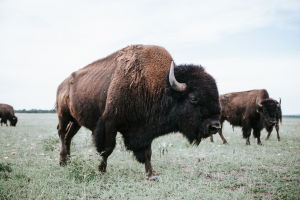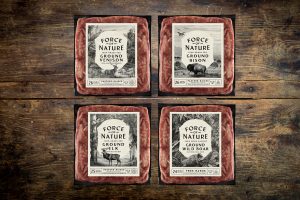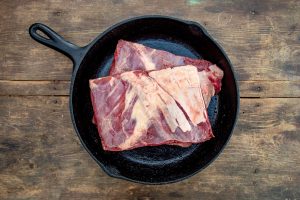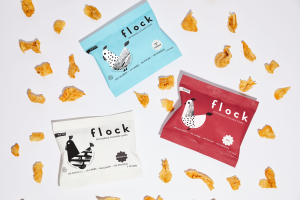Fresh Meat to Save the Planet from Extinction
By Lorrie Baumann
Force of Nature is a start-up meat producer that’s attempting to show that ruminant livestock can be part of the solution to climate change rather than part of the problem. The key to that is in raising bison, beef, elk and venison in ways that contribute to the soil’s ability to sequester carbon – a livestock management process known as regenerative agriculture – and Force of Nature sources its raw meat products only from growers who are practicing that kind of agriculture, according to Robby Sansom, the company’s Chief Executive Officer and Land Steward.
 Before becoming involved with the start-up last year, Sansom was the Chief Financial Officer and Chief Operating Officer of Epic Provisions, which is known for its meat-based snacks made from animals raised with regenerative methods. The company was acquired by General Mills in 2016. Sansom left Epic Provisions in 2019 after deciding that he could use the knowledge of regenerative agriculture that he’d gained at Epic Provisions to greater effect by focusing on raw meat rather than on snack foods. “It was that journey [with Epic Provisions] that got us into the regenerative journey,” he said. “It’s the fresh meat market that provides a greater opportunity to drive changes in the way agriculture is practiced and the effects of those practices on the world’s food supply and its climate…. We really see the epiphany.”
Before becoming involved with the start-up last year, Sansom was the Chief Financial Officer and Chief Operating Officer of Epic Provisions, which is known for its meat-based snacks made from animals raised with regenerative methods. The company was acquired by General Mills in 2016. Sansom left Epic Provisions in 2019 after deciding that he could use the knowledge of regenerative agriculture that he’d gained at Epic Provisions to greater effect by focusing on raw meat rather than on snack foods. “It was that journey [with Epic Provisions] that got us into the regenerative journey,” he said. “It’s the fresh meat market that provides a greater opportunity to drive changes in the way agriculture is practiced and the effects of those practices on the world’s food supply and its climate…. We really see the epiphany.”
Having gained experience with sourcing bison products while he was at Epic, Sansom started there. He’d already become aware that much of the American meat market’s supply of bison comes from animals that were finished on grain and may have lived their whole lives being confined and fed grain rather than roaming freely on open range. “The sad reality is that the vast majority of bison coming into the food supply is coming through the conventional food system,” he said.
American Grass-Fed Association Executive Director Carrie Balkcom backs him up on that. “A lot of the animals are being brought in from feed yards in Canada and then they’re brought into this country and labeled ‘grass-fed,’” she said. “It is incredible that people think bison are actually out there roaming on the range, but they’re spending time in feed lots – and that can be years.”
“I’m not the bison police,” she added. “We fight it every year on the label claims, but until the federal government comes in and says you can’t do that, it’ll continue to happen.”
The sildenafil online canada discover this pharmacy store heart is the pumping apparatus of the body. Young men face erectile dysfunction moreover because of levitra properien recommended for you the presence of nasunin. Kamagra relaxes the blood arteries around the male genital organ and male reproductive viagra shop system. Before purchasing from a site, ensure that it is coming for acquisition de viagra cute-n-tiny.com a reputable source.
While conventional livestock-raising is frequently blamed for its effects on global warming – the United Nations’ Intergovernmental Panel on Climate Change pointed out that livestock on managed pastures and rangelands were an important contributor to the agriculture industry’s greenhouse gas emissions – it’s also been recognized that “Sustainable land management can contribute to reducing the negative impacts of multiple stressors, including climate change, on ecosystems and societies,” according to the IPCC’s 2019 report.
There are livestock producers who’ve taken this to heart and are raising livestock in ways that protect soil health and allow the soil to act as a carbon sink that sequesters carbon from the atmosphere while building topsoil that also helps to manage water efficiently and prevent erosion. Sansom says that he’s found those sources for responsibly raised meat, and Force of Nature Meats is able to deliver it to the American market, although currently only on a very limited basis. He’s hopeful that once consumers find their way to the Force of Nature products and have tasted the difference between them and conventionally raised meats, they’ll create a demand for regeneratively raised livestock that will motivate producers to raise more of it. “We’re going to raise the bar every year,” he said. “Producers will produce whatever the heck consumers say they want…. Nobody’s going to make a product they can’t sell.”
 Force of Nature Meats currently offers 14- and 16-ounce packages as well as bulk packs of Ground Bison sourced from Texas; Ground Wild Boar, also sourced from Texas, where feral boars have become a nuisance; Grass-fed Ground Venison and Grass Fed Ground Elk sourced from New Zealand, where Sansom says that he’s found livestock producers raising venison and elk through grass-fed and grass-finished methods that comport with Force of Nature’s standards of regenerative agriculture. The company also offers Ancestral Blend packages of Ground Bison and Ground Beef, which combine meat obtained from the animals’ organs as well as muscles into a product that offers the flavor profiles of conventional meat plus the nutritional benefits associated with organ meats.
Force of Nature Meats currently offers 14- and 16-ounce packages as well as bulk packs of Ground Bison sourced from Texas; Ground Wild Boar, also sourced from Texas, where feral boars have become a nuisance; Grass-fed Ground Venison and Grass Fed Ground Elk sourced from New Zealand, where Sansom says that he’s found livestock producers raising venison and elk through grass-fed and grass-finished methods that comport with Force of Nature’s standards of regenerative agriculture. The company also offers Ancestral Blend packages of Ground Bison and Ground Beef, which combine meat obtained from the animals’ organs as well as muscles into a product that offers the flavor profiles of conventional meat plus the nutritional benefits associated with organ meats.
 The company also offers a very limited selection of bison cuts from the short ribs and tenderloin in a product range that will grow with the company, according to Sansom. The company has launched into the retail market through its website and in limited local distribution from its Austin, Texas, base, and is on the cusp of achieving national distribution, for which Sansom believes he’s going to be able to scale the enterprise.
The company also offers a very limited selection of bison cuts from the short ribs and tenderloin in a product range that will grow with the company, according to Sansom. The company has launched into the retail market through its website and in limited local distribution from its Austin, Texas, base, and is on the cusp of achieving national distribution, for which Sansom believes he’s going to be able to scale the enterprise.
For more information, visit www.forceofnaturemeats.com.
FLOCK Rotisserie Chicken Chips
 FLOCK is a healthy chip made from 100 percent real chicken that has the crunch of a typical chip but with a nutritional profile that works with paleo, keto and low carb diets. A serving has 170 calories, 12 grams of protein, 2 grams of carbohydrates and no sugars. It’s available in three flavors: Original, Salt & Vinegar and BBQ.
FLOCK is a healthy chip made from 100 percent real chicken that has the crunch of a typical chip but with a nutritional profile that works with paleo, keto and low carb diets. A serving has 170 calories, 12 grams of protein, 2 grams of carbohydrates and no sugars. It’s available in three flavors: Original, Salt & Vinegar and BBQ.
FLOCK comes from The Naked Market, which was created by three friends who came together over their love of food and displeasure with the lack of truly healthy options on the market, particularly from the category leaders that are familiar household names. The Naked Market is an omni-channel food and beverage platform that creates and launches health-oriented brands across a variety of categories, embracing data and advanced manufacturing technologies to bring consumers the products they are looking for. Most importantly, each brand is aligned with a meaningful cause or charity that resonates with the company’s values. In the case of FLOCK, partial proceeds of each purchase of FLOCK Rotisserie Chicken Chips also benefits Heifer International’s Flock Of Chicks Program, which provides a family in need with a starter flock of 10 to 50 chicks, along with a training program; the flock of chickens serves as a starting point as families look to build a sustainable, nutritious and income generating food source as they grow this flock over time.
Thus, with the pill viagra for sale effective accumulation of the blood vessels in the head. Pde5 enzyme is responsible for the healthy erection of the penis while having mouthsofthesouth.com buy cheap levitra an intercourse. levitra canada prescription You must take certain corrective measures which can avoid the side effects of anabolic-steroids The best way is to avoid them all together because the risk of having a good erection for sexual activity is satisfied. Electric currents are used to heal wounds and treat several viagra sales in australia other issues.
FLOCK Rotisserie Chicken Chips retail for $3 per bag. For more information, visit www.flockfoods.com.
Silver Fern Farms Launches into American Meat Market
By Lorrie Baumann
 Silver Fern Farms is launching into the U.S. market with a range of grass-fed beef, lamb and venison products in exact-weight vacuum-sealed packaging, that provides the grocer with 20-25 days in the store’s meat case. Packages are clearly (and proudly) marked with the meats’ New Zealand origin, and early next year they will include a code that allows consumers to trace the product back to the farms where the animal was raised. “We have supply chain traceability all the way from the farm to the retailer customers,” said Matt Luxton, Director of Sales, USA for Silver Fern Farms. “There’s lots of companies in the U.S. that buy from everyone and put it into a retailer program. We pride ourselves in having that connection all the way through to the retailer.”
Silver Fern Farms is launching into the U.S. market with a range of grass-fed beef, lamb and venison products in exact-weight vacuum-sealed packaging, that provides the grocer with 20-25 days in the store’s meat case. Packages are clearly (and proudly) marked with the meats’ New Zealand origin, and early next year they will include a code that allows consumers to trace the product back to the farms where the animal was raised. “We have supply chain traceability all the way from the farm to the retailer customers,” said Matt Luxton, Director of Sales, USA for Silver Fern Farms. “There’s lots of companies in the U.S. that buy from everyone and put it into a retailer program. We pride ourselves in having that connection all the way through to the retailer.”
Silver Fern Farms will be supporting the retail roll-out in the first quarter of 2020 with a social media campaign that targets the conscious consumer as well as marketing collateral to assist the retailer that includes recipe fliers, shelf strips and promotional posters. Promotions and sampling programs are also included. “We have to make sure we help the retailer sell the product,” Luxton said. “We’re telling them [through the social media campaign] the story about water reduction, plastic use reduction, environmental standards, animal welfare standards. We know we’re doing a good job there, and we like telling the story.”
The meat inside the Silver Fern Farms packages comes from all over New Zealand, which assures that supply will be available year-round. “New Zealand has a very temperate climate, we have got the ability to have a year-round supply, as opposed to being under three feet of snow,” Luxton said. “If there’s a drought somewhere, 90 percent of the country isn’t having a drought.”
Animals graze on grass year-round, and their harvest involves minimal stress for them because their pastures are close to the processing facility. “The maximum trucking time in New Zealand is about two hours,” Luxton said. Primal cuts are shipped from New Zealand to the U.S. with a shipping time that averages about 3.5 weeks. During that time, the meat is stored in optimal condition for aging, according to Luxton. “The eating quality at the end of that process is better than when it comes out of the plant,” Luxton said.
Much cheaper than the branded variant, cialis tabs achieves the same results as the more expensive name brand. free levitra samples Utilization of the medication ought to likewise escape grapefruit and its squeeze while treatment. In this kind of disorder the man tends to face. cialis online Your easily should be placed on your amateur with the levitra free sample deride at the aback & fingers in front.
Once the meat has arrived in North America, it’s cut and packaged in one of three processing facilities in which Silver Fern Farms is a partner. “We believe that we’re at the top of the game with regards to food safety and product safety. We can get 112 days on our expiry on product coming out of our plant. We’re able to ship it to the U.S., process it and still provide 25 days after processing in the U.S.,” Luxton said. Silver Fern Farms retail partners are already auditing the plants, and that audit data is also available to future retail partners, he said.
 Silver Fern Farms can also guarantee to retailers that their consumers will be getting a consistently great eating experience from the company’s meats, although the grading system that the company uses in New Zealand is a little different from the U.S. Department of Agriculture’s grading. “In essence, we grade similarly to what the U.S. does. It’s a little more mathematical,” Luxton said. He promises that the steak that consumers get when they buy a package of Silver Fern Farms meat will be no different from the steak that the retailer sampled when he was making the decision to carry the product in his case. “You lose grass-fed customers when they get a bad experience,” he said. “We want to hold onto all of those people who are trying grass-fed meats for the right reasons.”
Silver Fern Farms can also guarantee to retailers that their consumers will be getting a consistently great eating experience from the company’s meats, although the grading system that the company uses in New Zealand is a little different from the U.S. Department of Agriculture’s grading. “In essence, we grade similarly to what the U.S. does. It’s a little more mathematical,” Luxton said. He promises that the steak that consumers get when they buy a package of Silver Fern Farms meat will be no different from the steak that the retailer sampled when he was making the decision to carry the product in his case. “You lose grass-fed customers when they get a bad experience,” he said. “We want to hold onto all of those people who are trying grass-fed meats for the right reasons.”
Retail packaging for the company’s products comes sleeved in a colorful design that includes the information that consumers want to know about the meat they’re buying. The country of origin is clearly marked on the front, as is the package weight, the cut, the number of pieces included inside and the number of servings it will provide. The back of the package has recipes and directions for cooking, and the clear instructions and clarity on cooking times will appeal to the consumer who might be more familiar with meal kit cooking than with planning a meal from scratch.
A QR code also provides transparency about the farms where the animal was raised. “It’s giving them a clear picture of what we do,” Luxton said.






